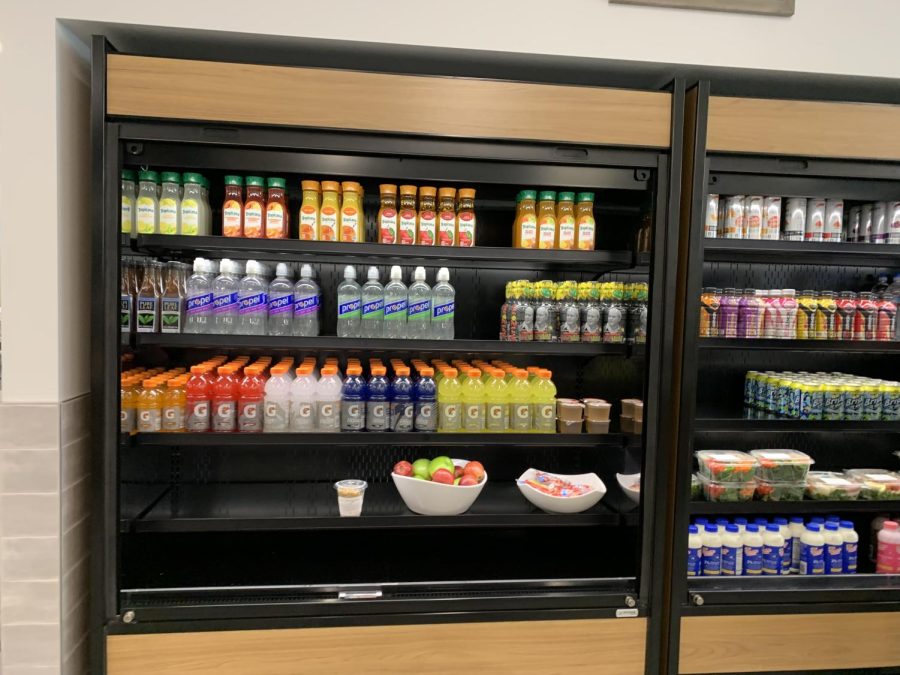DePaul Prep takes steps toward sustainability in student dining; single-use plastic a challenge
Environmental consciousness is something that we as a society can always be better at. Learning different, and simple, ways to keep our community clean and sustainable is key to becoming more environmentally conscious. At DePaul College Prep, many practices and learning spaces promote sustainable practices and improve students’ knowledge of the environment.
QuestFood, the organization that manages DePaul Prep’s student dining services, uses a few major sustainability practices. Through the EarthAware program and NearBuy, Quest prioritizes buying food from local growers, decreasing fossil fuel use, and minimizing their carbon footprint.
Reusable plates and utensils were the original plan for dining spaces in the school, but with COVID restrictions, QuestFood was forced to use disposable, single-use silverware and plates during the height of the pandemic.
Since then, the main dining hall has transitioned to using all reusable plates and flatware that are washed and reused each day.
Melissa Flynn, teacher of one of DePaul Prep’s most popular electives titled Sustainable Urban Food Systems and Culinary Arts, notes the sustainability measures that the school’s dining spaces have embraced, including plans to use the school’s garden.
“The cafeteria is doing a great job at bringing back reusable plates. We’ve been working with the cafeteria to grow some things for them next year; so it’d be literally garden to fork right here at DePaul,” Flynn said.
Students also play a major role in the dining spaces’ sustainability efforts, according to school President Mary Dempsey.
“Students can help us by being careful NOT to throw out utensils and dishes when they clear their eating area and to put those items in the bins provided to be washed for the next sitting. It’s expensive to replace those items and they should not be thrown in the trash. We encourage our students to be more aware and to assist us in these efforts,” Dempsey said.
Single-use plastic a challenge for school dining
At any large school that serves food to hundreds of students each day, environmentally friendly practices are a major challenge, especially when it comes to single-use plastic in food packaging.
The DePaul Prep dining hall has a wide variety of food options, ranging from pre-packaged salads, sandwiches, and hot meals; as well as pre-packaged candy and chips. Beverage options include water bottles, Sparkling Ice, and Gatorade — all packaged in plastic.
QuestFood Services make all items — besides drinks, candy and snacks — fresh every morning. Then the grab and go items are put into plastic packaging and sold. Around 300 plastic drinks and 70 grab and go items are sold every day and later disposed of by DePaul Prep students.
Some students wonder whether DePaul Prep’s food services could reduce plastic waste to help the environment, as waste from schools can be an issue. According to Fortune Magazine, a single middle school can create more than 30,000 pounds of waste through its lunchroom each year. Additionally, in Chicago, less than 9 percent of the city’s waste is recycled. Although these are very large societal issues, DePaul Prep is able to do some good by reducing its single-use plastic, in the eyes of some students.
Freshman Kiara Novakovic believes that DePaul Prep, “should switch to sustainable materials because of the amount of daily waste we produce across grade levels. With sustainable materials, we are able to limit the amount of waste produced daily.”
However, other students acknowledge that it might not be possible to cut single-use plastics from the school’s food services. Sophomore Grace Connolly buys her lunch at school every day and says that while she would like for sustainable options to be available, she’s not sure how switching away from plastic packaging would affect the quality of the food.
While switching to reusable materials seems like a good idea, there are many potential drawbacks.
Terese Williamson, the food service director for Quest Food Services at DePaul Prep, says that, “There is one negative effect of not using single use plastic. This would be Quest not being able to offer grab and go items like salads and sandwiches. All of the grab and go cold items are prepared fresh in house. Cutting or limiting the use of single serve plastic items would prohibit this.”
This switch could also affect the beverage options available. If DePaul Prep switched to reusable cups, the same beverages could be offered, but they would be found in the Coffee Bar instead. This would reduce the convenience of being able to quickly enter the Dining Hall, grab whatever beverage you need, and leave, since the use of reusable cups would lengthen the process of getting lunch.
Most schools rely on single-use plastics in food packaging, but a few have created zero waste initiatives to attempt to reduce their plastic waste. Schools such as Oak Park River Forest High School, Southside Occupational Academy High School, and Nettelhorst Elementary have created zero waste initiatives, working with the organization Seven Generations Ahead to reduce their consumption.
Oak Park River Forest High School focused its sustainability initiative on food waste instead of plastic waste through clearly labeling recycling, landfill, and compost bins, as well as creating a waste audit to track how much waste is being disposed of.
While plastic food and beverage packaging is a main contributor to DePaul Prep’s plastic waste, another source is the use of plastic silverware in Corboy Hall. The main dining hall uses reusable plates and silverware, but Corboy Hall uses plastic. According to Williamson, this is because in Corboy Hall, “there is no way to transport reusable plates and silverware back to the kitchen.”
In order to use reusable utensils in Corboy Hall, Quest staff would have to transport the plates and silverware back to the main servery in the Dining Hall to be washed. This is not possible at this time because the staff would not be able to bring the dishes to the Dining Hall to be washed and then return them back to Corboy before the next lunch period.
Reusable plates and silverware planned for South Wing dining space
Currently, the plan is for the new dining space in the South Wing (which will open for the 2023-24 school year) to use reusable plates and silverware, showing DePaul Prep’s commitment to becoming more sustainable in the coming years.
Williamson states that, “there are plans in place now to switch over to all reusable plates and silverware,” which was confirmed by President Dempsey. Details for plans for next year are still being finalized, and while these new potential plans would not completely get rid of DePaul Prep’s plastic waste, with waste still being generated from grab & go items, it could alleviate the amount of plastic waste.
For teacher Melissa Flynn, sustainability also comes down to students learning to be more aware of what they throw away.
“Just think about what you’re throwing out and how you’re using each item. It is really hard on the environment when we make new things, and it is far better to reuse things. When we have to throw things out think of how best to do that. Compost, recycle, or, last choice, landfill.”







